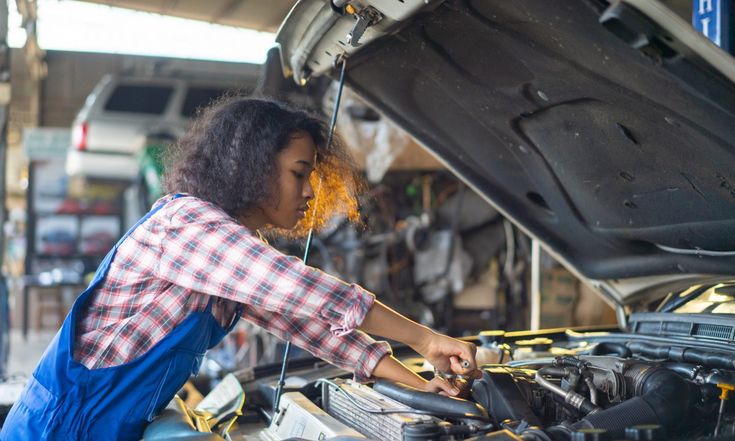We all want our cars to last as long as possible, but sometimes, without even realizing it, we can make little mistakes that add up over time. Whether you’re a newbie car owner or a seasoned driver, we all slip up now and then. Don’t worry though—we’ve got your back! Here are the 5 most common car maintenance mistakes people make and how you can avoid them to keep your ride in top shape.
1. Ignoring the Check Engine Light
You’ve probably seen it glow up on your dashboard—bright and angry, like a little red warning siren. What do you do? Most of us will ignore it. “It’s probably just a glitch,” we think. But no, it’s not a glitch—it’s your car’s way of saying, “Hey, something’s not right here!”
Why it’s a mistake:
Ignoring the check engine light can lead to bigger problems down the road. Small issues like a loose gas cap or a failing oxygen sensor can escalate into expensive repairs if left unchecked.
What to do instead:
Take your car to a mechanic to get the codes read. It’s usually a quick, inexpensive fix that can save you from a major breakdown later on.
2. Waiting Too Long Between Oil Changes
Oil changes are often seen as just another car chore we’d rather avoid. We tell ourselves, “I’ll do it next week… and the week after that…” But that “next week” can easily turn into months.
Why it’s a mistake:
Your engine’s oil is essential for lubricating all the moving parts and keeping everything running smoothly. Over time, the oil breaks down and loses its effectiveness. Skipping oil changes can lead to engine overheating, increased wear, and eventually, an expensive engine failure.
What to do instead:
Follow your car manufacturer’s recommended oil change schedule. Most cars need an oil change every 3,000 to 7,000 miles (or about every 3 to 6 months). Set a reminder so you never forget!
3. Not Checking Tire Pressure Regularly
It’s easy to assume your tires are just fine. After all, they look alright, don’t they? But did you know that driving with under-inflated tires can hurt your fuel economy, cause uneven tire wear, and reduce traction? Plus, over-inflated tires are at a higher risk of popping. Not ideal!
Why it’s a mistake:
Low tire pressure increases rolling resistance, which means your engine has to work harder, burning more fuel. It also puts more strain on your tires, leading to premature wear. If tires are over-inflated, they’re more likely to pop, especially when driving at high speeds.
What to do instead:
Check your tire pressure once a month—especially before long trips. Use a tire pressure gauge (it’s a cheap tool that could save you big time) or head to a gas station that has a pressure check machine. And don’t forget to check the tire pressure when the tires are cold for the most accurate reading.
4. Forgetting to Replace the Air Filter
The air filter in your car is like the lungs of your engine. It makes sure that clean air gets into the engine so that it runs efficiently. Over time, however, your air filter gets clogged with dust, debris, and other nastiness. If left unchecked, it can reduce fuel efficiency and performance.
Why it’s a mistake:
A dirty air filter can cause your engine to work harder, leading to lower fuel economy, sluggish acceleration, and reduced engine lifespan.
What to do instead:
Change your air filter every 12,000 to 15,000 miles, or as recommended in your car’s owner’s manual. If you’re driving in dusty areas or frequently in stop-and-go traffic, you may want to replace it more often. It’s a simple, affordable fix that pays off in the long run.
5. Skipping Regular Brake Inspections
Brakes are arguably one of the most important parts of your car—yet many of us only think about them when we hear that high-pitched squeal or feel the car pulling to one side. But by then, it could be too late.
Why it’s a mistake:
Ignoring brake issues until the last minute can lead to a complete brake failure, putting you and others at risk. Worn-out brake pads can also damage other components of the braking system, leading to expensive repairs.
What to do instead:
Check your brake pads every 10,000 miles or so, or have a professional inspect them during regular maintenance. If you hear squeaking or grinding when you apply the brakes, don’t wait—get them checked out immediately.
Bonus Tip: Neglecting the Battery
Don’t let your car’s battery turn into a ticking time bomb! A dead battery on a rainy day is no one’s idea of fun.
Why it’s a mistake:
If you don’t check the battery terminals for corrosion or ensure that your battery is properly charged, you could find yourself stranded. A battery that’s on its last legs could fail without warning.
What to do instead:
Inspect your battery regularly for corrosion or leaks. Check the battery terminals to make sure they’re clean and tight. If your battery is more than 3-5 years old, consider getting it replaced.
Give Your Car Some Love
Your car is like a trusted friend—it gets you where you need to go, and in return, it deserves a little care. By avoiding these common maintenance mistakes, you’ll keep your car running smoothly and save yourself from expensive, stress-inducing repairs down the road.
So, keep an eye on that check engine light, change the oil on time, and make sure those tires are inflated properly. Your car will thank you with years of smooth rides—and you’ll save money in the process. Happy driving!
